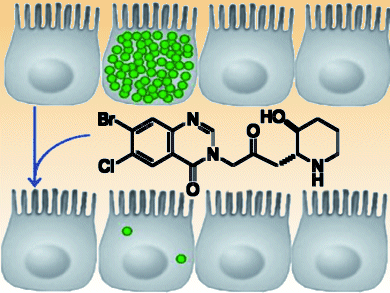Malaria infects hundreds of millions and kills more than one million people each year. Malaria parasites are transmitted via the bite of Anopheles mosquitoes; they initially travel to the liver, where they develop and proliferate asymptomatically. After their release from the liver the parasites invade red blood cells, causing malaria’s characteristic recurrent fevers and severe disease. Most therapeutics target this symptomatic phase of infection, whereas the liver stage presents a potential prophylactic strategy that would prevent progression to the life-threatening blood stage.
The liver stage, however, remains poorly understood, and until recently has not been a significant focus for small-molecule inhibitor development. This is largely due to the lack of assay platforms amenable to high-throughput screening (HTS).
In a collaborative effort between Jon Clardy and Emily Derbyshire, Harvard Medical School, USA, and Ralph Mazitschek, Center for Systems Biology at Massachusetts General Hospital, USA, miniaturized HTS-compatible assays were developed for in vitro profiling of small molecules active against liver-stage malaria. This study identified halofuginone (pictured) as a potent inhibitor of liver-stage malaria that rapidly clears parasites even after the infection has been established.
- Characterization of Plasmodium Liver Stage Inhibition by Halofuginone,
E. R. Derbyshire, R. Mazitschek, J. Clardy,
ChemMedChem 2012, 7(05).
DOI: 10.1002/cmdc.201200045



